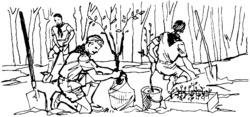 What if a high school math teacher decided that during her geometry class she would start teaching her students about calculus?
What if a high school math teacher decided that during her geometry class she would start teaching her students about calculus?
What if questions about calculus appeared on the course midterm or final exam?
In the first instance, the teacher could be trying to show her students that what they’re learning – in what to some may be a pointless geometry class – is of value further along in the spectrum of mathematics. After all, calculus does rely on many of the concepts learned from geometry.
But in the second case, the teacher is clearly out of bounds for expecting that her students should demonstrate some proficiency in limits, differentials or integrals – subject matter that isn’t required by the geometry curriculum.
Yet there are some in Scouting who apply the same practices with our Scouts. Continue reading “No more, no less”





